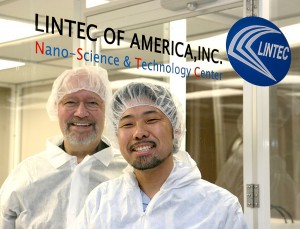
A recent agreement between The University of Texas at Dallas and Lintec of America is expected to propel scientific discoveries from the University’s laboratories into the global marketplace and create jobs in North Texas.
UT Dallas’ Office of Technology Commercialization has licensed to Lintec of America a process developed over several years by Dr. Ray Baughman, the Robert A. Welch Distinguished Chair in Chemistry, and his colleagues at the University’sAlan G. MacDiarmid NanoTech Institute, which he directs.
The patented process transforms tiny tubes of carbon — 10,000 times thinner than the width of a human hair — into useful large-scale structures, such as sheets and yarns, that are super-strong and extremely light. The carbon nanotube materials have unique thermal, mechanical and electrical properties, making them potentially suitable for use in areas such as wearable electronics, electronic displays, solar panels, sound projectors, batteries and harvesters of waste energy.
Lintec of America is a subsidiary of Japan-based Lintec Corporation, a leading manufacturer of pressure-sensitive adhesives. The company’s advanced materials and industrial products are used in items ranging from electronic devices and computer displays to building and automotive materials.
Lintec recently opened the Nano-Science & Technology Center in Richardson. Less than 5 miles from the UT Dallas campus, it is devoted specifically to the manufacture and commercialization of the carbon nanotube structures.
Dr. David E. Daniel, president of UT Dallas, said the whole process — from lab to marketplace — exemplifies how research universities impact the economy and society.
“One of the important roles a research university plays in the community is to translate the creativity and human talent developed on campus into the private sector,” he said.
“This agreement is an example of UT Dallas doing exactly what it should be doing — fostering an ecosystem of hugely creative faculty who educate and train exceptional students, who then contribute significantly to business and add value to society.”
Additionally, two UT Dallas alumni are leading efforts at the Nano-Science & Technology Center: Dr. Kanzan Inoue MS’01 PhD’05 is managing director of the facility, and his wife, Dr. Raquel Ovalle-Robles MS’06 PhD’08, is the chief research and intellectual properties strategist. Both worked in the NanoTech Institute with Baughman and Dr. Anvar Zakhidov, professor of physics.
Inoue said proximity to the University and access to its intellectual resources were primary factors in locating the new facility in Richardson.
“The Nano-Science & Technology Center was created to bridge the gaps between laboratory research, pilot production and ultimately full production processes,” he said. “Individual carbon nanotubes (CNTs) are much lighter, stronger and more thermally conducting than metals or diamond. However, applying CNTs in practical applications requires scalable and controllable processing methods for assembling them into products without losing the unique properties of individual CNTs.”
Inoue also said that a critical factor for controllable device fabrication is the ability to assemble CNTs in different forms, such as free-standing or on a substrate.
“The technology developed at UT Dallas delivers an efficient and elegant solution to these key issues,” he said. “The electrically conducting CNT sheets that we can now make are lighter than air, transparent and much stronger per pound than steel.”
Lintec has been an industrial affiliate of the NanoTech Institute for many years, and Baughman said the pairing of the UT Dallas science and technology with the company’s manufacturing capabilities was a natural match.
“Lintec has expertise in technologies that will be critically important for economically manufacturing carbon nanotube sheets and converting these sheets into a wide range of products,” said Baughman, a National Academy of Engineering member who joined the UT Dallas faculty in 2001 after a 30-year career in private industry.
“They invested in UT Dallas technology because they saw potential for valuable end products and because their manufacturing capabilities are particularly well-suited for upscaling the production of these materials to industrial levels.”
Baughman said the licensing agreement will enable “teaming” that eliminates barriers between scientific and technological breakthroughs and products, which is an important goal of the NanoTech Institute.
“I’m very happy that Lintec decided to open its new facility in Richardson in order to be close to and work collaboratively with our NanoTech Institute, and that they are creating jobs in Texas,” he said. “I’m also delighted that the leaders of this new business venture are UT Dallas alumni from our institute. I know how brilliant they are and look forward to their accomplishments.”
Source: University of Texas at Dallas




